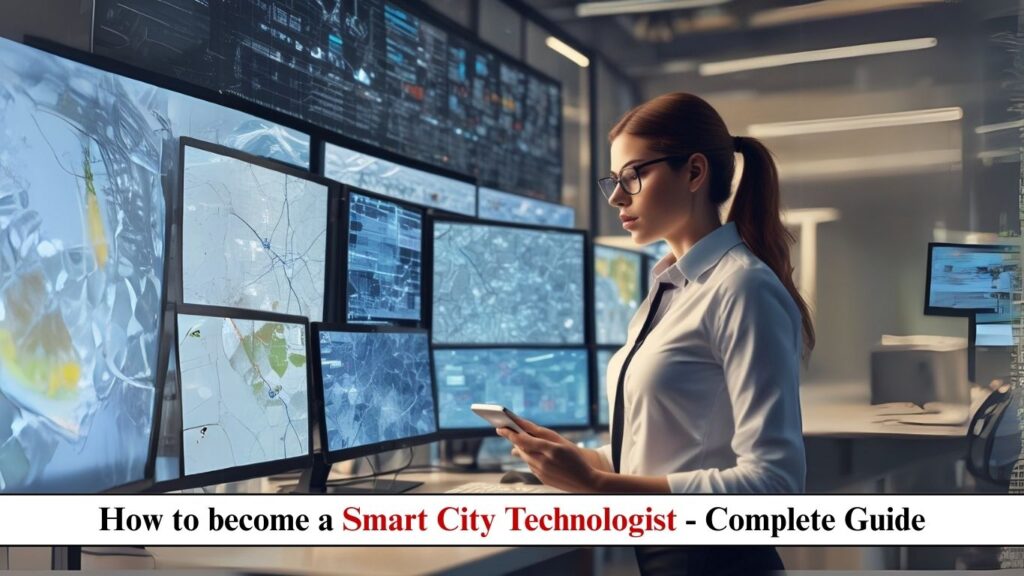
Introduction to Smart City Technology
The global smart cities market is projected to reach $6.5 trillion by 2030, transforming urban landscapes through IoT, AI, and sustainable infrastructure. Smart City Technologists are the architects of this revolution—multidisciplinary experts who integrate urban planning, data science, and civic technology to build cities of the future.
This guide covers:
- Evolution of smart city concepts
- Global salary benchmarks
- Core responsibilities
- Required technical stack
- Step-by-step career path
- Future urban innovations
Whether you’re a civil engineer, data analyst, or policy specialist, this guide reveals how to build an impactful career in urban technology.
History of Smart Cities
Early Concepts (1960s-1990s)
- 1960s: “Plug-in City” conceptual designs (Archigram)
- 1974: First traffic control system (Los Angeles)
- 1993: Singapore launches Intelligent Island initiative
Digital Infrastructure Era (2000-2015)
- 2005: Barcelona deploys city-wide WiFi
- 2009: IBM pioneers Smarter Cities Challenge
- 2014: Sidewalk Labs proposes Toronto Quayside
AI & Sustainability Revolution (2016-Present)
- 2018: NEOM announces $500B zero-carbon city
- 2021: Singapore’s Virtual Twin achieves 95% accuracy
- 2024: AI optimizes 50% of NYC’s energy grid
- 2025: WHO certifies first health-responsive city
Smart City Technologist Salary (2024)
| Experience Level | Average Salary (US) | Global Hotspots |
|---|---|---|
| Entry-Level (0-2 yrs) | $70,000-$95,000 | Dubai (+35%) |
| Mid-Career (3-5 yrs) | $95,000-$140,000 | Singapore (+40%) |
| Senior (5+ yrs) | $140,000-$220,000 | Zurich (+50%) |
Specialty Premiums:
- Urban AI Modeling: +$25,000
- Resilience Planning: +$30,000
- Citizen Data Privacy: +$20,000
Roles & Responsibilities
1. Infrastructure IoT Integration
- Deploy 5G-connected sensors for:
- Air quality monitoring
- Smart waste management
- Adaptive street lighting
- Maintain city-wide digital twin platforms
2. Data Analytics & AI
- Develop predictive models for:
- Traffic flow optimization
- Energy demand forecasting
- Crime prevention
- Implement computer vision for public safety
3. Urban Mobility Solutions
- Design MaaS (Mobility-as-a-Service) systems
- Program autonomous shuttle routing
- Optimize EV charging networks
4. Sustainability Systems
- Model carbon-negative districts
- Automate water recycling plants
- Deploy urban microgrid controllers
5. Civic Technology
- Develop citizen engagement apps
- Secure blockchain voting systems
- Manage open data portals
Required Qualifications
Technical Skills Matrix
| Category | Essential Technologies |
|---|---|
| IoT Platforms | Siemens MindSphere, Cisco Kinetic |
| Data Science | Python (Pandas, GeoPandas) |
| Urban Modeling | CityEngine, UrbanFootprint |
| GIS Systems | ArcGIS, QGIS |
| Cloud Computing | AWS Smart City Competency |
Certification Pathway
- Foundational:
- Smart City Certified Professional (SCCP)
- AWS Certified Smart City Specialist
- Mid-Career:
- ISO 37120 Sustainable Communities
- LEED Neighborhood Development
- Advanced:
- MIT Urban Technology Certificate
- NIST Cybersecurity for Critical Infrastructure
How to Get Started: 5-Step Roadmap
Step 1: Build Core Knowledge
- Complete Coursera’s Smart Cities Specialization
- Master urban data visualization (Tableau, Kepler.gl)
- Study municipal procurement processes
Step 2: Gain Practical Experience
- Entry-Level Roles:
- Urban Data Analyst (65k−65k−85k)
- IoT Field Technician
- Alternative Paths:
- Code for America Brigade
- UN-Habitat Urban Lab
Step 3: Specialize
- High-Demand Niches:
- 15-minute city planning
- Disaster-responsive infrastructure
- Circular economy systems
Step 4: Build Portfolio
- Create open-source urban dashboards
- Publish case studies on Medium
- Develop prototype civic apps
Step 5: Target Employers
- Public Sector:
- NYC Office of Technology
- Singapore GovTech
- Private Sector:
- Sidewalk Labs
- AECOM Digital Cities
Future Scope & Trends
1. Emerging Technologies
- 2025: Self-healing concrete with embedded sensors
- 2027: Drone highways for urban logistics
2. New Urban Models
- Floating smart districts
- Underground infrastructure networks
- AI-managed vertical farms
3. Market Growth
- $2T Asian smart city investments by 2030
- 400% increase in climate resilience tech
4. Career Innovations
- Metaverse Urban Planners
- City-Scale Cybersecurity Chiefs
- Autonomous Zone Managers
Conclusion: Is This Career Right For You?
✅ Ideal Candidate:
- Passion for civic impact + technology
- Comfort with complex stakeholder ecosystems
- Systems thinking for urban challenges
🚀 Action Plan:
- Master urban data science fundamentals
- Earn SCCP certification
- Network at Smart City Expo World Congress
- Specialize in one urban domain
With 68% of humanity projected to live in cities by 2050, smart city technologists will shape civilization’s future.
Want our free smart city project checklist? Comment below!
Questions about public vs private sector paths? Ask here!













Post Comment